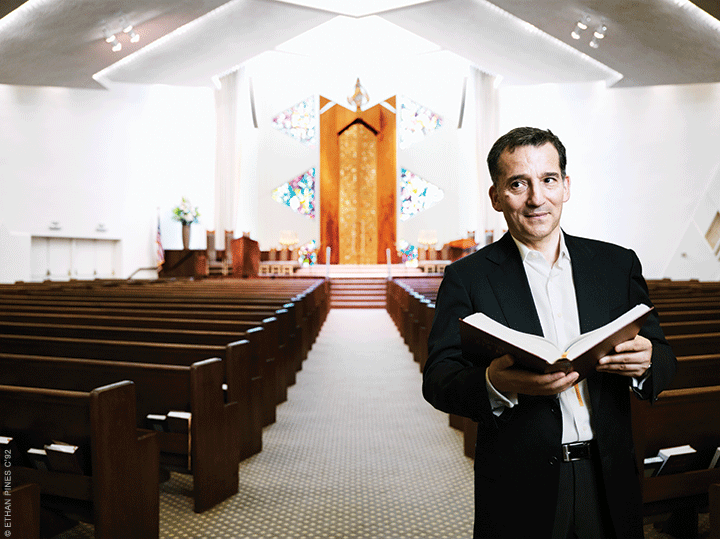
Rabbi David Wolpe is an admired writer, the popular leader of one of the largest Conservative Jewish congregations in the country, and one of the “50 most influential Jews in the world,” according to one authoritative source. His latest book, David: The Divided Heart, delves into one of the Bible’s most fascinating—and human—characters.
BY BETH KISSILEFF | Photography by Ethan Pines C’92
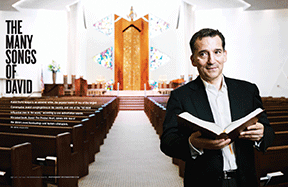
When Rabbi David Wolpe C’81 was preparing to write about the ancient Biblical figure of David, he approached his near-mythical character in a very un-mythical manner.
“I thought of David the way I think of someone when I do a funeral,” Wolpe says simply. “The same person has lots of different roles. You hear from their spouse, their kids. They are lots of different things to different people in their lives. That’s what David was.”
Of course David was, and is, much more than that—an “exquisitely relevant as well as fascinating character,” as Wolpe contends in David: The Divided Heart, published last year by Yale University Press as part of its Jewish Lives series.
“He is great because of his complexity, not in spite of it,” Wolpe writes. “David is a man of contradictions, noble and base, lyrical and brutal, all of which coexist in a quieter state in each human breast. We see ourselves in this man, and we see this man in ourselves.” True, Wolpe couldn’t interview David’s spouses or children, and he necessarily relies on careful readings of the Book of Samuel and Chronicles and centuries of Biblical scholarship and commentary. But the book—whose nine chapters include thoughtful examinations of David as Lover and Husband, Sinner, Father, and Once and Future King—revels in the man’s all-too-human weaknesses as well as his formidable strengths.
“It is such a big, messy, wonderful story,” says Wolpe, the Max Webb Senior Rabbi of Sinai Temple in Los Angeles. David “speaks to modern Jews about the state and the contradictions of the state—war and savagery and plotting and manipulation and all of that. But at the same time, he is a central religious figure. He is credited with writing the only personal prayers in the Bible, the Psalms. If you are looking for a book to express the individual human soul, you have only the Psalms in the Bible.”
Furthermore, David’s “legacy endures,” adds Wolpe, who three years ago was named one of the 50 most influential Jews in the world by The Jerusalem Post. After all, “Jerusalem is celebrating the 3,000th year as the City of David,” he points out.
“Finally and most powerfully, David is a deeply flawed figure who is still a hero. That idea, that we don’t think a person can be great and flawless, is something we struggle with every single day.” At this point, Wolpe makes a bankable prediction based on the eternal verities of human nature: “There will soon be a David and Bathsheba scandal—I should write the editorial now!”
It may be that David suffers from the vertigo of success. To have risen so quickly, to be God’s chosen one, beloved of the people, powerful and young, with fistfuls of promise, may require a balance, a leveling. A fall.
David rises from his house and walks about on the roof, “And he saw from the roof a woman bathing, and the woman was very beautiful.” David inquires and is told she is “Bathsheba daughter of Eliam wife of Uriah the Hittite.”
—From David: The Divided Heart.
After David has Bathsheba brought to his palace and sleeps with her, Wolpe recounts, he sends her home, only to find out later that she is pregnant. He orders Uriah to return from war and tries to convince him to go to his wife (which would have shifted the suspicion of paternity), but Uriah refuses as long as his comrades-in-arms are fighting in the field. Finally David secretly arranges for Uriah to be killed in battle.
“Of course, cover-ups are futile before an omniscient God,” writes Wolpe. “In ancient Israel, God spoke primarily through prophets.” And when the prophet Nathan tells David a parable about a rich man who took a poor man’s ewe in order to feed a wayfarer who had come to him, David rails against the rich man, prompting Nathan to respond accusingly: “You are the man.”
Behold a hinge of history. No matter how literally we take the story of David, this moment of reaction is indelible and enduring. Nathan continues to speak in God’s voice, telling David that he has given him everything, and would have given more, but David instead chose to commit both adultery and murder “by the sword of the Ammonites”—reminding us of the special cowardice involved in proxy murder. As a result, the son born of the adulterous union will die and another will lie with David’s wives.
Here is what David did not do: He did not have Nathan put to death. … That David did not seek to silence Nathan might be, religiously and historically, his moment of redemption.
Watching David Wolpe speak in public is a little like watching a magic act. A slight, handsome-but-otherwise-ordinary-looking guy gets up, opens his mouth, and casts spells on his audience. After one recent talk at the New York Historical Society, when he spoke at length about the relationship of Abraham Lincoln to the Jews and civil religion in America, a man approached him and asked for a copy of his remarks. Wolpe pulled out a piece of paper the size of a business card. On it he had written a few words. “That’s it,” he said. “Those are my remarks.”
He pulls it off without secret chords or kabbalistic symbols. Writing is “a discovery of what it is I think and believe, the process by which I discover what is inside me,” he explains, and despite his formidable gifts as a speaker, he still holds the written word in higher esteem. (When asked about his serious brushes with mortality—two surgeries for a brain tumor, and a bout with lymphoma—he deferred to his piece on “My Last Cancer Treatment” in the Huffington Post, written in early 2010 and updated in late 2011, knowing that he had been more precise in print than he was likely to be in a phone interview.)
Though he says he is not a person who can sit alone in a room and think, he trusts in E. M. Forster’s credo that “I don’t know what I think until I see what I say,” adding, “I discover what I think through articulation.”
To write well, of course, one must read well, and widely.
“I follow what the critic Randall Jarrell wrote,” he says: “‘Read at whim.’” The whims in which he was indulging when we spoke last fall were:Absence of Mind, a collection of essays by Marilynne Robinson; a book about the religious Zionism of Rabbi Abraham Isaac Kook; Bernard Cornwell’s Waterloo; and Roger Grenier’s The Palace of Books. “Whatever grabs my interest I read,” he adds. “I do what my professor in English said to do.”
It was during his freshman year at Penn that Wolpe went to an English professor whose name he can’t recall and told him how much he loved to read and write, then confessed that he wanted to become an English professor himself. The professor demurred. “Be a writer and read what you want” and you won’t be obliged to teach the same texts year after year, Wolpe’s would-be mentor advised.
It was good advice. Wolpe remains a writer by design and by temperament, rising early each day to put his thoughts on paper or online. “Carve out a time that is sacred every day and sit down and do it,” he advises aspiring writers. “There is no other formula.”
Though he has been called the “most influential rabbi in America” by Newsweek, one could argue that Wolpe is still not so much a rabbi as a writer in rabbinic guise. His first book, published in 1990 when he was 31 and director of the Library of the University of Judaism in Los Angeles, was The Healer of Shattered Hearts: A Jewish View of God, which described his own evolution from atheist to rabbi and made a compelling case for Jews to reestablish their relationship with God. Kirkus Reviews hailed it as a “beautifully crafted exposition of the major topics of rabbinical Jewish theology” and praised Wolpe’s “rare and elegant writing style,” concluding: “Many a grateful reader will anticipate further offerings from this fresh voice of dramatic, intelligent faith.” Between that and David (his eighth) he wrote six other well-received books, ranging from Why Be Jewish? and Why Faith Matters to Making Loss Matter: Creating Meaning in Difficult Times.
He writes in short form as well—in a weekly column syndicated to Jewish newspapers throughout the country as well as through social media, where he regularly disseminates messages to his 10,700 Twitter followers and the 57,000 people who have liked his page on Facebook. “Remember in disagreement to leave the door open,” he wrote on his Facebook page in late July. “Speak passionately but not insultingly. The person you argue with today may be your ally tomorrow.”
Although he treads carefully in the world of politics—“I really see my role as apolitical,” he told the online magazine Tablet shortly after agreeing to give the benediction at the 2012 Democratic National Convention—Wolpe is not afraid of controversy, and he has stirred some up. He once gave a Passover sermon in which he told his congregation that “the way the Bible describes the Exodus is not the way it happened, if it happened at all,” which earned him a public lambasting from radio host Laura Schlessinger, among others, even though his arguments were in line with current Biblical criticism and scholarship. (He also proposed that Conservative Judaism change its name to Covenantal Judaism, though that never gained traction.)
“To the extent that we have in American Jewish culture a leading rabbi, certainly he’s the leading rabbi in the non-Orthodox sphere,” says Jeffrey Goldberg C’87, the highly regarded national correspondent for The Atlantic, who often writes about Jewish matters [“Journalism, Jews, and Jeffrey Goldberg,” May|June 2011]. In Goldberg’s well-traveled view, there’s a “crisis of confidence in the rabbinate,” one stemming from the fact that the “bonds or the feeling of obligation that Jews had to join synagogues is dissipating. You have so many different challenges, even on issues that were consensus issues for a couple of generations, including and especially Israel. And a lot of rabbis have lost their way. What you have in David Wolpe is a guy who still knows why he’s doing this, and he still manages to keep a lot of different parts of Judaism and Jewish expression in balance.”
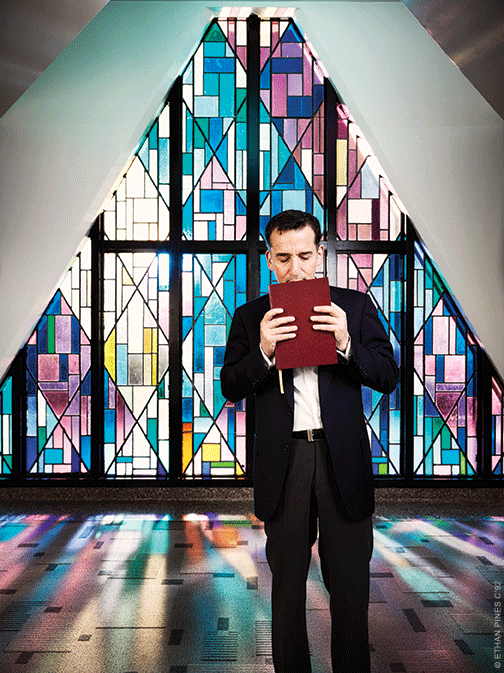
Had Wolpe become another kind of writer instead—a full-time biographer, say, or a journalist—“he still would have been very successful,” Goldberg adds. “As it is, he’s very successful [as a writer]—and he’s also doing the four or five other things that a successful rabbi must do.”
Wolpe tends to write quickly, and acknowledges that haste can lead to errors in judgment. A couple of years ago, in a piece titled “Have We Forgotten What Bar Mitzvahs Are All About?” that first appeared on WashingtonPost.com, he criticized a video of a Dallas boy’s Las Vegas-revue-style bar mitzvah ceremony as “egregious, licentious and thoroughly awful,” containing “so much that is offensive that it requires restraint to hold oneself to three ways in which this display slaughters the spirit.” After a number of correspondents, including the boy’s rabbi, responded angrily to what Wolpe conceded was “appearing to insult a child and those who love him,” he wrote another column apologizing to the boy and his family and explaining that he had written the first column “at white heat.” As a rabbi, he added, “I should know better than to push ‘send’ without calm and consideration.” But he also took the opportunity to re-emphasize his point about the debasement of a sacred rite of passage—more gently this time, but no less firmly. Yom Kippur was coming up, he noted: “I intend to examine my soul, understand my misdeeds and try to do better. As a community, let’s look at what we are teaching our children, and do the same.”
Central to the religious life, he suggests, is the imagination. “Most of us find it difficult to inhabit the lives of others,” Wolpe wrote last year in one of his New York Jewish Week columns. “If we are straight we find it hard to imagine what it is to be gay; if white, to be black; if always rich, to be poor, and vice versa. But in order to live truly moral lives we need imagination. To project yourself into the experience of the other is essential to leading a good and compassionate life.”
Certainly, Wolpe’s experiences as a rabbi have been central to his personal growth and his evolution as a writer. He is able to understand people’s lives at different ages and see not only the effect of parents on children but the effect of maturing children on their aging parents.
“Being a rabbi in a synagogue is very growthful to one’s soul,” he says. “It forces one’s soul to grow.” Because he gets to teach “people in every condition of life—death and tragedy and marriage and birth and joy,” he adds, “I think in a lot of ways, it is a fuller, more difficult life than if I had chosen just to write and teach.”
When Wolpe graduated from Akiba Hebrew Academy in Philadelphia, his father—the late Gerald Wolpe, chief rabbi of Har Zion Temple in Penn Valley—inscribed his yearbook with a pastiche of ideas about his Biblical namesake. Although the senior Wolpe did not quote any particular verse, his son recounts in the book’s preface, he conveyed an “essential message” about the David who “sang many songs.” The younger Wolpe was “deeply touched,” and went “right to the book of Samuel to find the source.” From then on, he was hooked. And when Yale University Press invited him to write one of its books about an eminent Jewish figure, Wolpe had no trouble deciding on his subject.
“This king of Israel was the Bible’s most complex character,” he writes. “His life was entangled with war, women, and offspring who both betray and succeed him. He won battles and feigned madness, founded a city and served an enemy ruler, slayed a giant and fled from his own child.”
“The name David means beloved, and no character in the Bible is as loved as David,” Wolpe adds, noting that the vicissitudes of his own life have made David “seem more real—more human. No longer persuaded or enchanted by the purism of youth, I have come to expect contradictions in every human soul, and to defend the stubborn integrity of the divided heart.”
Wolpe draws from a wide range of sources to explore what David has meant over time. In describing the witch of En-Dor, who raises up a spirit from the dead for King Saul, Wolpe writes that the scene is “full of the intrigue of Macbeth by way of Stephen King.” His own methodology, he notes, “combines ancient and modern sources in what is essentially a character study,” one whose implications go beyond the religious. This is a particularly modern David, one who “believes himself loved by God and chosen by God,” Wolpe writes. “Yet he also knows, given the tragedies of his life, that God’s favor is never given without cost. Those costs undercut any temptation to self-righteousness. Novelists are drawn to David because the complexity of modern literature is well suited to this most intricately woven, colorful, and complicated portrait in the entire Bible.”
Last fall, Warner Brothers optioned the movie rights to David: The Divided Heart, though he downplays the significance of that. “If you are a rabbi in Los Angeles and your book is not optioned for a movie, they won’t renew your contract,” he said at the outset of his remarks at the New York Historical Society. “It’s a local thing.”
In The New Rabbi: A Congregation Searches for Its Leader (Bantam, 2002), author Stephen Fried C’79 writes that Rabbi Gerald Wolpe knew what his Har Zion congregation really wanted in his successor. “They want what every congregation wants: a younger, hipper version of their beloved rabbi, someone who has all of his qualities and none of his imperfections, all of his wisdom plus all of the energy he expended acquiring that wisdom. And, in this case, there just happens to be a rabbi who almost perfectly fits that description.
“Unfortunately, they can’t have David.”
Despite his distinguished rabbinical heritage (his brother Daniel is also a rabbi), Wolpe didn’t set out to become a rabbi, and in his younger years said he would never become one. During his time at Penn, says his longtime friend Mitch Albom, “being a rabbi was the furthest thing from his mind.” In fact, writes Fried, Wolpe was then “an avowed atheist, studying English lit and writing sardonic columns” for The Daily Pennsylvanian.
“My gut instinct about religion was that it wasn’t intellectually challenging and thoughtful, like English literature,” Wolpe told Fried. “And I thought that people who believed in God were basically simpleminded, needed a crutch.”
Wolpe spent his junior year of college at the University of Edinburgh in Scotland. In a short essay titled “Our Music,” he wrote: “Enchanted with English poetry, I wrote a letter to my father telling of my love of Wordsworth, the romantic poets, the wonder and variety of English verse. My father, who was a devotee of literature and my first teacher, wrote back that he was glad I found inspiration and nourishment in them. But then he added something important.
“Remember David, he said, English poetry became the poetry of the world on the backs of British soldiers. The Jewish people too had our Wordsworth and our Tennyson; they were named Ibn Gabirol, Yehuda Halevy, Bialik and Tzernichovsky. Only they had no armies; they had only their words. Don’t neglect them, he wrote, for they belong to you.”
During his year in Edinburgh, Wolpe recounted in Making Loss Matter, he “walked only once, briefly, into a synagogue.” But that period of time “removed from religion,” he says in our interview, enabled him to “breathe, to return to my tradition a freer man,” and gave him an opportunity to divest himself “completely of all the influences that shaped me—like anybody who really goes away for the first time.” It also represented both his first encounters with “raw anti-Semitism” and the first time in which he was able to live “completely without the shadow of my family and my father.” That shadow appears to have been a substantial one, but leaving it for a year allowed him to “return without resentment,” Wolpe notes in the interview, adding that the “times of faith” as well as the “periods of dark doubt” are all part of the “systolic-diastolic relation of faith.” By facing up to the important reality of doubt in a life of faith, Wolpe is able to reach others who also lack total certainty.
Not long after he graduated from Penn, the “recalcitrant rabbi” (as he calls himself) was teaching Hebrew school, working at Urban Outfitters, and attempting to write.
“I basically took a year off—read, wrote, and tried to decide what to do with my life,” he explains. He spent the summer working at Camp Ramah in Ojai, California, the West Coast branch of the Ramah camp he attended in the Pennsylvania Poconos. The camp rabbi then was Elliot Dorff, now rector and professor of philosophy at the American Jewish University in Los Angeles. Dorff acknowledges wryly that he had a reputation among the counselors for “being dangerous,” explaining: “If I talk to you, you might end up in rabbinical school.” He told Wolpe that if he wanted to be a writer, being a rabbi would be of great assistance.
“I saw his interactions—he was creative and funny, all things you would hope for in a rabbi,” says Dorff, who told Wolpe: “You’ll be great at it, enjoy it, and then have a platform to take time and do your writing without worrying about whether it gets published or not.” And as a rabbi, his platform would be quite unlike that of most writers.
Dorff believes his message was heard partly because he “happened to be there at the right time,” and partly because his opinion of Wolpe’s eminent suitability for the rabbinate was “more objective,” since he was neither a member of the family nor a member of Gerald Wolpe’s congregation. He takes pride in the work and career of his protégé, whose use of “general literature as well as Jewish literature” makes “his points all the stronger” and lends a “note of universalism to what he says and a note of sophistication.” Wolpe’s message, Dorff adds, is “not just narrow and Jewish but deeply human.”
Around that time Wolpe was beginning to reexamine his dim view of religion at the University of Judaism in Los Angeles. There he saw “really serious thoughtful people who had read and knew stuff,” he told Stephen Fried. “It was the first time I thought maybe I had dismissed this too quickly.”
The speaking gifts so central to his rabbinical success were evident early on. When the grandmother of his high-school friend Mitch Albom died, Wolpe delivered the eulogy. Albom’s family had wanted someone who had known his grandmother to do the funeral, and decided to ask Mitch’s friend the rabbinical student, who met that requirement, among others. As Albom writes in the foreword to Making Loss Matter, Wolpe “spoke wonderfully, a farewell that balanced the loss of the moment with the gains of a lifetime. On that day, in that dark moment he offered a beacon.” It would be many years before Albom found out that it was the first eulogy Wolpe had ever given.
In The New Rabbi, Fried writes that the only pulpit Wolpe ever considered was that of “fabled Sinai Temple in Los Angeles,” whose congregation was “bolstered by the migration of Jews to the entertainment business and later invigorated by an influx of very traditional Jews from Iran.” Wolpe, writes Fried, “was beloved by the younger big machers in the congregation—especially top movie producer Marc Platt [C’79] and his wife, Julie [Beren Platt C’79, now president of Penn Alumni], who had been classmates of his brother Paul’s [C’78] at Penn.” He accepted the job in the spring of 1997.
Not long after that, Wolpe told Fried: “I don’t think I could have had anything like the success I’ve had thirty years ago, because I’m not a great scholar, who’s going to listen to me? But the field of religion isn’t like that anymore. You don’t have to write a book with a thousand citations for someone to say, ‘OK, I’ll take this guy seriously.’ My editor said to me, ‘I want you to speak from your own authority as a spiritual teacher.’ Nobody would have said that at the peak of my father’s rabbinate.”
A few years ago, Tablet asked Wolpe about his popularity and success.
“In the Kaddish D’rabbanan, we say of scholars ‘al talmideihon v’al talmidei talmideihon’—‘on their students and on their students’ students,’” Wolpe replied. The aphorism, he explained, meant that “your greatest success as a rabbi is if long after you’re gone, your teaching still influences people.”
“And you don’t know that,” he added. “You don’t know whether it will happen or not. So, I hope that I have scored my greatest successes as a rabbi. But if so, it’s hidden from me. But posterity will know—and I’ll just pray that it’s true.”
Beth Kissileff Gr’98 is a freelance writer based in Pittsburgh and the author of Questioning Return, to be published next year by Mandel Vilar Press.



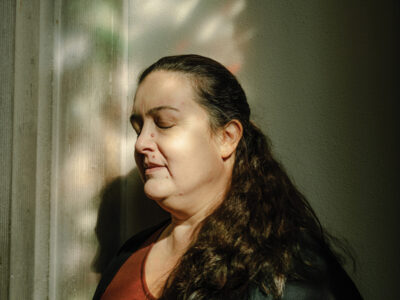
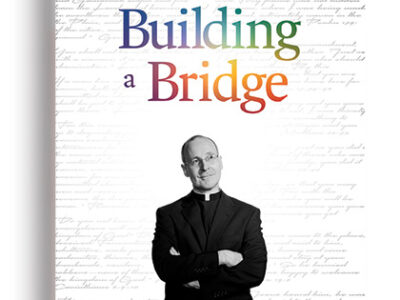
I knew and became somewhat friendly with David Wolpe during his last couple of years at Penn. and I am not surprised by his success at all.